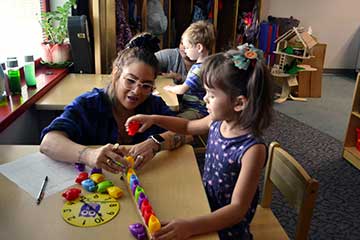Child Development Microcredential
What is a Microcredential?
Whether you are looking to upgrade skills in your current profession or enter a new field, a microcredential may be for you. Microcredentials are short, industry-focused credentials designed to provide in-demand skills that reflect the “shop floor” needs of industry. They are accelerated or “bite sized” training opportunities focused on a specific professional or career discipline and can lead to a certificate or to an initial or advanced degree.
 The Child Development Microcredential taught at SUNY Schenectady exceeds the 120 clock
hours of professional development required by the Council for Professional Recognition
to obtain the international CDA Credential. The Child Development Microcredential
provides a minimum of 195 hours of professional development for the Infant Toddler
CDA, the Preschool CDA, and the Family Child Care CDA. The college courses for the
3 CDA types are offered virtually Monday and Wednesday evenings, January to July.
It focuses on the six CDA Competency Standards, recognized nationally and internationally,
and established by The Council for Professional Recognition. Graduates may be qualified
to work in a number of different environments.
The Child Development Microcredential taught at SUNY Schenectady exceeds the 120 clock
hours of professional development required by the Council for Professional Recognition
to obtain the international CDA Credential. The Child Development Microcredential
provides a minimum of 195 hours of professional development for the Infant Toddler
CDA, the Preschool CDA, and the Family Child Care CDA. The college courses for the
3 CDA types are offered virtually Monday and Wednesday evenings, January to July.
It focuses on the six CDA Competency Standards, recognized nationally and internationally,
and established by The Council for Professional Recognition. Graduates may be qualified
to work in a number of different environments.
The program prepares students to:
- Demonstrate professional knowledge of early childhood development.
- Plan, implement, assess and evaluate a developmentally appropriate curriculum that aligns with standards set forth by National Association for the Education of Young Children, New York State Early Learning Guidelines and The NYS Prekindergarten Learning Standards, as applicable for the Preschool CDA.
- Demonstrate the skills and abilities of the effective early childhood teaching professional.
- Demonstrate an understanding of the role of the early childhood professional dedicated to ethical practice and cultural responsiveness.
Child Development Microcredential Courses
This course examines infant and toddler development with an emphasis on the importance of the first thirty-six months in relation to human development. It emphasizes attachment, early brain research, and developmentally appropriate practices as critical factors which impact a caregiver’s role in meeting individual children’s needs. The course requires ten observation hours.
This course is a study into the principles of child growth and development from conception to adolescence. The course content will focus on the physical, cognitive, social and emotional domains of development. The student will be required to observe the development of a child outside the classroom in order to complete a comprehensive child study project. In order to complete this major project, 10-20 hours of outside observation are required.
Part-time TAP for Non-Degree Credentials Eligibility
The Child Development microcredential is eligible for the New York State Part-Time Tuition Assistance Program (TAP) for Non-Degree Credentials program. Provided that you meet the income eligibility requirements, this program may be able to contribute toward the cost of tuition. Income eligibility is as follows:
- $125,000 for dependent undergraduate students, independent students who are married and have tax dependents, or independent students who are unmarried and have tax dependents
- $60,000 for married independent undergraduate students who have no other dependents
- $30,000 for unmarried independent undergraduate students with no dependents
If you believe you earn less than the amount listed in the criteria above, you should apply by completing the FAFSA and TAP applications. Please note you have a lifetime of eight semesters of TAP. These will be prorated for the number of credits you earn, but will use a portion of your lifetime TAP eligibility. Please contact the Office of Financial Aid at 518-381-1468 or email to financialaid@sunysccc.edu with any questions.
Learn More
To learn more about the Child Development Microcredential, please reach out to Lauren Lankau at 518-396-5982 or lankaul@sunysccc.edu or reach out to Professor Tammy Calhoun at 518-381-1295 or calhoutb@sunysccc.edu.